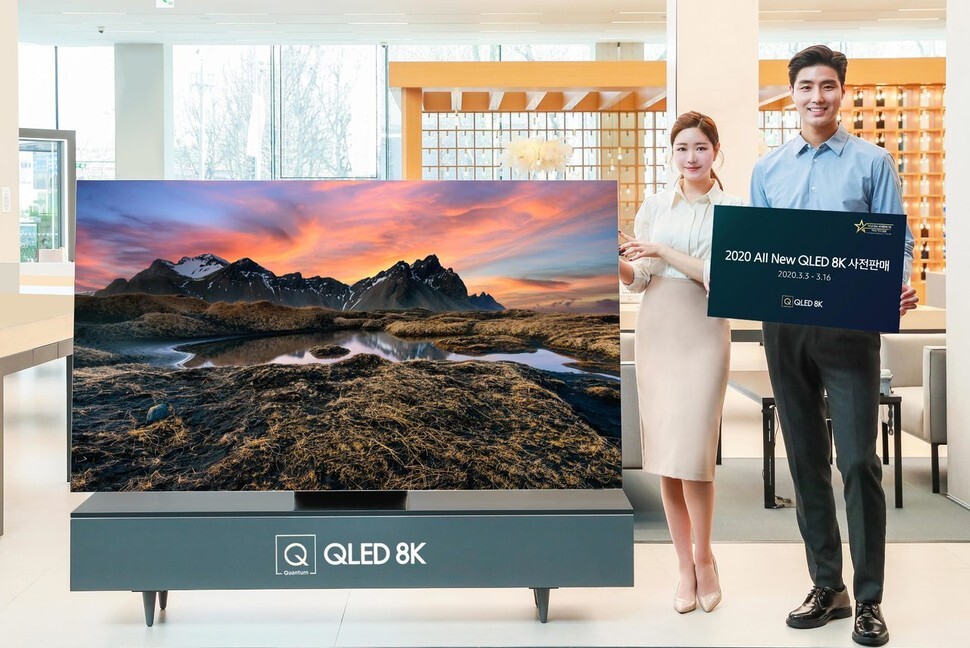hankyoreh
Links to other country sites 다른 나라 사이트 링크
5G communications, 8K TVs set back by coronavirus crisis

The spread of the novel coronavirus has cast a pall on the electronics industry, which had hoped 2020 would bring a flourishing market with new 5G and 8K technologies. In addition to supply difficulties and declining demand, companies are now facing a major setback to their sales strategies with the postponement of the Olympics, which had been expected to give the industry its biggest boost in recent times.
This year had been predicted as an inflection point in the expansion of the 5G communications market. After being ushered in by South Korea in April of last year, the 5G market has failed to gain significant momentum despite the launch of new 5G products by such major businesses as Samsung Electronics and Huawei. Reasons for this include inadequate communications networks and limited devices. According to figures from the market research institution Counterpoint Research, 5G devices accounted for just 1% of the smartphones sold in 2019. Some had been predicting the situation would improve in 2020 as the expanded product range brought prices down, with high-end smartphone leader Apple releasing its first 5G smartphone.
While Apple has released a new product every September since 2011, many are predicting its new release this year could end up delayed. After Nikkei Asian Review reported that the launch of the new iPhone 12 could be put off by several months, the global investment bank JP Morgan echoed it with a similar prediction on Mar. 25, citing “multiple bottlenecks in EVT (engineering verification test) [. . .] due to recent travel restrictions imposed globally.” According to this analysis, Apple may also shy away due to concerns that sales may not back up market expectations for the release for the “first 5G iPhone.”
Top global player Samsung Electronics faces a similarly difficult situation. In addition to slack sales for the Galaxy S20 device launched last month in an ambitious bid to secure an advantage in the 5G market, Samsung’s factory in the Indian city of Noida, which is responsible for 40% of its annual production (around 300 million units), is to remain closed from Mar. 23 to Apr. 14. Huawei, which has built its market influence through domestic demand in China, has also suffered a direct hit. An analysis by Counterpoint Research showed its February smartphone sales were down by 14% from the same period in 2019, with a steep 38% decline in China. Huawei has typically held large-scale new product releases at the Mobile World Congress (MWC) event in February of each year -- but since this year’s MWC was cancelled due to the virus, it has been unveiling its new 5G products exclusively online.
TV manufacturers have been dealt a big blow as well. South Korean companies like Samsung Electronics and LG Electronics, along with major TV producers such as Japan’s Sony and Panasonic, had been planning to use the 2020 Tokyo Olympics, originally scheduled to launch this July, as a springboard for promoting their 8K TVs. With 8K boasting resolution four times greater than the 4K displays that dominate the current TV market, Japan had been preparing for live 8K broadcasting of the Olympics. Manufacturers had been expanding their own 8K TV lineups in response -- but the postponement of the Olympics to next year means companies will miss out on the benefits of the “Olympics premium.”
By Song Gyung-hwa, staff reporter
Please direct comments or questions to [english@hani.co.kr]

Editorial・opinion
![[Column] The state is back — but is it in business? [Column] The state is back — but is it in business?](https://flexible.img.hani.co.kr/flexible/normal/500/300/imgdb/original/2024/0506/8217149564092725.jpg) [Column] The state is back — but is it in business?
[Column] The state is back — but is it in business?![[Column] Life on our Trisolaris [Column] Life on our Trisolaris](https://flexible.img.hani.co.kr/flexible/normal/500/300/imgdb/original/2024/0505/4817148682278544.jpg) [Column] Life on our Trisolaris
[Column] Life on our Trisolaris- [Editorial] Penalties for airing allegations against Korea’s first lady endanger free press
- [Editorial] Yoon must halt procurement of SM-3 interceptor missiles
- [Guest essay] Maybe Korea’s rapid population decline is an opportunity, not a crisis
- [Column] Can Yoon steer diplomacy with Russia, China back on track?
- [Column] Season 2 of special prosecutor probe may be coming to Korea soon
- [Column] Park Geun-hye déjà vu in Yoon Suk-yeol
- [Editorial] New weight of N. Korea’s nuclear threats makes dialogue all the more urgent
- [Guest essay] The real reason Korea’s new right wants to dub Rhee a founding father
Most viewed articles
- 1[Column] Why Korea’s hard right is fated to lose
- 2Amid US-China clash, Korea must remember its failures in the 19th century, advises scholar
- 3[Column] The state is back — but is it in business?
- 460% of young Koreans see no need to have kids after marriage
- 5Presidential office warns of veto in response to opposition passing special counsel probe act
- 6Japan says it’s not pressuring Naver to sell Line, but Korean insiders say otherwise
- 7[Editorial] Stagnant youth employment poses serious issues for Korea’s future
- 8[Guest essay] Maybe Korea’s rapid population decline is an opportunity, not a crisis
- 9OECD upgrades Korea’s growth forecast from 2.2% to 2.6%
- 10Hybe-Ador dispute shines light on pervasive issues behind K-pop’s tidy facade